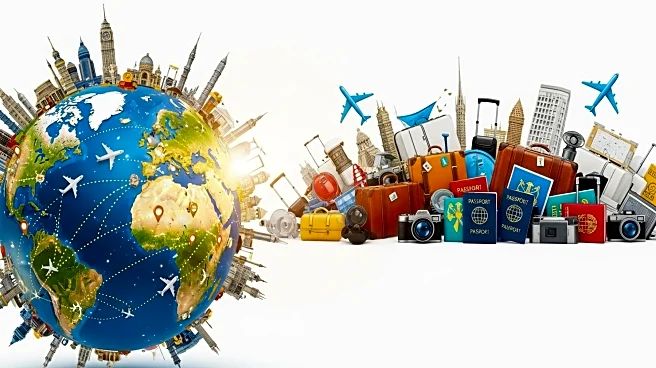What is the story about?
What's Happening?
The World Travel & Tourism Council (WTTC) has released a report indicating that the travel and tourism sector is poised to support one in three new jobs globally by 2035. However, the report highlights significant workforce challenges, predicting a shortfall of over 43 million positions if proactive measures are not taken. The sector, which supported a record 357 million jobs worldwide in 2024, is expected to support 371 million jobs this year. Despite this growth, demographic and structural shifts, including shrinking working-age populations and the impact of the pandemic, could result in a 16% shortfall in required roles by 2035. The report identifies recruiting and retaining talent, along with technological and sustainable practices, as key challenges. Countries like China, India, and the European Union are expected to face the largest workforce shortfalls, with Japan, Greece, and Germany also experiencing significant gaps.
Why It's Important?
The projected workforce shortfall in the travel and tourism sector has broad implications for global economies and employment. As one of the largest job creators, the sector's inability to fill positions could hinder economic growth and development. The shortage of skilled workers may impact service quality and innovation within the industry, affecting its competitiveness. Countries facing significant shortfalls, such as China and India, may experience economic strain, while the demand for low-skilled roles that require human interaction remains high. Addressing these challenges is crucial for sustaining the sector's growth and ensuring it continues to provide diverse career opportunities. The report calls for collaboration between governments and educators to align education with industry needs, adopt digital and AI technologies, and promote sustainable practices.
What's Next?
The WTTC report outlines several strategies to address the workforce challenges in the travel and tourism sector. These include showcasing the diversity of career opportunities, aligning education with industry needs, and creating leadership pathways. The adoption of digital and AI technologies and sustainable practices are also emphasized. The report urges collaboration between governments, educators, and industry leaders to implement these strategies and ensure the sector remains a rewarding field for future generations. As global unemployment is expected to fall and working-age populations shrink, the pressure on labor supply will increase, necessitating immediate action to attract and retain talent.
Beyond the Headlines
The workforce challenges in the travel and tourism sector highlight broader demographic and structural changes affecting labor markets globally. The pandemic's impact on employment and the shrinking working-age population are reshaping industries, necessitating a reevaluation of how talent is attracted and retained. The emphasis on sustainable practices and digital adoption reflects a shift towards more resilient and adaptable business models. These changes could lead to long-term shifts in employment patterns, with increased focus on skills development and flexible work arrangements. The sector's ability to adapt to these changes will be crucial for its continued growth and contribution to global economies.














